 W
WOn 3 November 2019, Daman Collector Rakesh Minhas issued a Section 144 order banning peaceful assembly of four or more persons, slogan-shouting and the use of loudspeakers across the entire district of Daman and ordered the conversion of Government High School, Bhimpore and the Government Sarvottam High School, Moti Daman into 'temporary jails'. This was in response to a land ownership dispute between the local indigenous fishing community and the local administration that had confiscated their land and bulldozed their homes. The ensuing protest resulted with the detention of 70 protesters in the 'temporary jails' and another 8 arrests. Few of the adivasi fisherfolk were rehoused whilst most languished traumatised and homeless on the streets near the rubble of their razed homes.
 W
WAgrarian Justice is the title of a pamphlet written by Thomas Paine and published in 1797, which proposed that those who possess cultivated land owe the community a ground rent, which justifies an estate tax to fund universal old-age and disability pensions and a fixed sum to be paid to all citizens upon reaching maturity.
 W
WAgricultural policy describes a set of laws relating to domestic agriculture and imports of foreign agricultural products. Governments usually implement agricultural policies with the goal of achieving a specific outcome in the domestic agricultural product markets.
 W
WAlternative legal systems began to be used by Irish nationalist organizations during the 1760s as a means of opposing British rule in Ireland. Groups which enforced different laws included the Whiteboys, Repeal Association, Ribbonmen, Irish National Land League, Irish National League, United Irish League, Sinn Féin, and the Irish Republic during the Irish War of Independence. These alternative justice systems were connected to the agrarian protest movements which sponsored them and filled the gap left by the official authority, which never had the popular support or legitimacy which it needed to govern effectively. Opponents of British rule in Ireland sought to create an alternative system, based on Irish law, which would eventually supplant British authority.
 W
WAnimal genetic resources for food and agriculture (AnGR) are a subset of genetic resources and a specific element of agricultural biodiversity. The term animal genetic resources refers specifically to the genetic resources of avian and mammalian species, which are used for food and agriculture purposes. Further terms referring to AnGR are "farm animal genetic resources" or "livestock diversity".
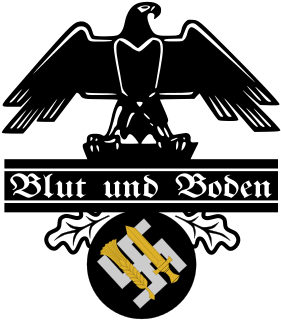 W
WBlood and soil is a nationalist slogan expressing Nazi Germany's ideal of a racially defined national body ("blood") united with a settlement area ("soil"). By it, rural and farm life forms are idealized as a counterweight to urban ones. It is tied to the contemporaneous German concept of Lebensraum, the belief that the German people were to expand into Eastern Europe, conquering and displacing the native Slavic and Baltic population via Generalplan Ost.
 W
WBrook Farm, also called the Brook Farm Institute of Agriculture and Education or the Brook Farm Association for Industry and Education, was a utopian experiment in communal living in the United States in the 1840s. It was founded by former Unitarian minister George Ripley and his wife Sophia Ripley at the Ellis Farm in West Roxbury, Massachusetts in 1841 and was inspired in part by the ideals of transcendentalism, a religious and cultural philosophy based in New England. Founded as a joint stock company, it promised its participants a portion of the profits from the farm in exchange for performing an equal share of the work. Brook Farmers believed that by sharing the workload, ample time would be available for leisure activities and intellectual pursuits.
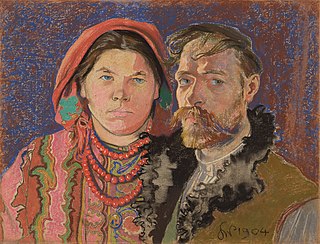 W
WChłopomania or Khlopomanstvo are historical and literary terms inspired by the Young Poland modernist movement and the Ukrainian Hromady. The expressions refer to the intelligentsia's fascination with, and interest in, the peasantry in late-19th-century Galicia and right-bank Ukraine.
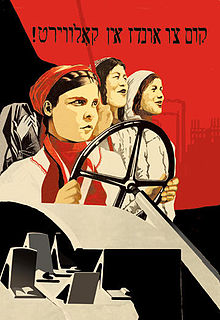 W
WCollective farming and communal farming are various types of "agricultural production in which multiple farmers run their holdings as a joint enterprise". There are two broad types of communal farms: agricultural cooperatives, in which member-owners jointly engage in farming activities as a collective, and state farms, which are owned and directly run by a centralized government. The process by which farmland is aggregated is called collectivization. In some countries, there have been both state-run and cooperative-run variants. For example, the Soviet Union had both kolkhozy and sovkhozy.
 W
WThe country life movement was an early 20th century American social movement which sought to improve the living conditions of America's rural residents. The movement focused on preserving traditional rural lifestyles while addressing poor living conditions and social problems within rural communities. Despite the movement's rural focus, many of its adherents were urbanites who sought to bring progressive changes and technological improvements to rural areas. The movement had little success in changing rural ways of life; its principal successes were the promotion of agricultural extension programs and the development of national organizations to improve rural living.
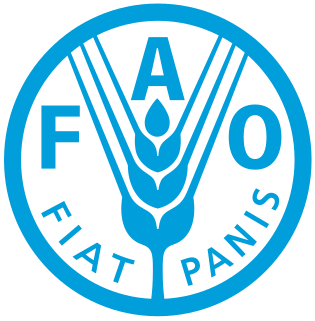 W
WDAD-IS is the acronym of the worldwide Domestic Animal Diversity Information System of the Food and Agriculture Organization of the United Nations, within the FAO's management of animal genetic resources programme. It includes a searchable database of information about breeds, the Global Databank for Animal Genetic Resources; it also holds tools for management, and contacts for the National and Regional Coordinators for the programme. Data from the Global Databank is used for reporting on the global status and trends of animal genetic resources. The fourth version of the DAD-IS was launched on 21 November 2017.
 W
WLuke Day Jr. was an American military officer, revolutionary, and farmer, most familiar for his leadership role in Shays' Rebellion, for which he was convicted of high treason and sentenced to death, before being pardoned by Governor John Hancock. He was referred to as the "Master Spirit" of the insurrection, and was only passed over as overall leader in favor of Daniel Shays due to the perception of overzealousness on his part, by his men. As a lieutenant, and then a captain, he served for eight years and participated in many key battles of the American Revolutionary War, including the Siege of Boston, Quebec Expedition, Battles of Saratoga, Cherry Valley massacre, Sullivan Expedition and Siege of Yorktown. After the war, he joined the prestigious Society of the Cincinnati, which included the likes of George Washington and Alexander Hamilton.
 W
WThe Diggers were a group of religious dissidents in England, sometimes seen as forerunners of modern anarchism, and also associated with agrarian socialism and Georgism. Gerrard Winstanley's followers were known as True Levellers in 1649, in reference to their split from the Levellers, and later became known as Diggers because of their attempts to farm on common land.
 W
WThe Farm Labor Organizing Committee (FLOC) is a labor union representing migrant farm workers in the Midwestern United States and North Carolina.
 W
WThe Food and Agriculture Organization of the United Nations (FAO) is a specialized agency of the United Nations that leads international efforts to defeat hunger and improve nutrition and food security. Its Latin motto, fiat panis, translates to "let there be bread". It was founded in October 1945.
 W
WAbraham M. George is an Indian-American businessman, academic, and philanthropist. He is the founder of The George Foundation (TGF), a non-profit organization based in Bangalore, India dedicated to the welfare and empowerment of economically and socially disadvantaged populations in India. His foundation has initiated numerous projects in poverty alleviation, education, healthcare, lead poisoning prevention, women's empowerment, and press freedom. He founded the Shanti Bhavan school to help provide free education to socially disadvantaged kids from age 4 through college.
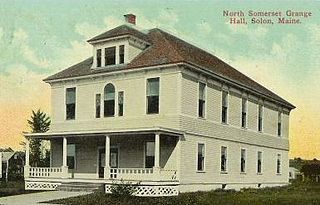 W
WThe Grange, officially named The National Grange of the Order of Patrons of Husbandry, is a social organization in the United States that encourages families to band together to promote the economic and political well-being of the community and agriculture. The Grange, founded after the Civil War in 1867, is the oldest American agricultural advocacy group with a national scope. The Grange actively lobbied state legislatures and Congress for political goals, such as the Granger Laws to lower rates charged by railroads, and rural free mail delivery by the Post Office.
 W
WHigh-fructose corn syrup (HFCS), also known as glucose–fructose, isoglucose and glucose–fructose syrup, is a sweetener made from corn starch. As in the production of conventional corn syrup, the starch is broken down into glucose by enzymes. To make HFCS, the corn syrup is further processed by D-xylose isomerase to convert some of its glucose into fructose. HFCS was first marketed in the early 1970s by the Clinton Corn Processing Company, together with the Japanese Agency of Industrial Science and Technology, where the enzyme was discovered in 1965.
 W
WThe International Agrarian Bureau, commonly known as the Green International, was founded in 1921 by the agrarian parties of Bulgaria, Czechoslovakia, Poland and Yugoslavia. The creation of a continental association of peasants was championed by Aleksandar Stamboliyski of the Bulgarian Agrarian National Union, but originated with earlier attempts by Georg Heim. Following Stamboliyski's downfall in 1923, the IAB came to be dominated by the Republican Party of Farmers and Peasants in Czechoslovakia, whose member Karel Mečíř served as its first leader. Mečíř was able to extend the IAB beyond its core in Slavic Europe, obtaining support from the National Peasants' Party in Greater Romania; as an ideologue, Milan Hodža introduced the Green International to European federalism.
 W
WThe International Food Policy Research Institute (IFPRI) is an international agricultural research center founded in the early 1970s to improve the understanding of national agricultural and food policies to promote the adoption of innovations in agricultural technology. Additionally, IFPRI was meant to shed more light on the role of agricultural and rural development in the broader development pathway of a country. The mission of IFPRI is to provide research-based policy solutions that sustainably reduce poverty and end hunger and malnutrition.
 W
WIoan Lazăr Kalinderu was a Wallachian, later Romanian jurist and confidant of King Carol I, who served for thirty years as the administrator of crown domains, and for three years as president of the Romanian Academy. Educated in France, he was the son of a rich and influential Greek-Romanian banker, Lazăr Kalenderoglu, and the brother of physician Nicolae Kalinderu. Like them, he was a sympathizer of the National Liberal Party, with which he debuted in politics in the 1880s.
 W
WThe Kilvenmani massacre was an incident in Kizhavenmani village, Tamil Nadu, India on 25 December 1968 in which a group of around 44 people, the families of striking Dalit village labourers, were murdered by a gang, allegedly led by their landlords. The chief accused was Gopalakrishnan Naidu.
 W
WThe Peasant International, known most commonly by its Russian abbreviation Krestintern (Крестинтерн), was an international peasants' organization formed by the Communist International in October 1923. The organization attempted to achieve united front relations with radical peasant parties in Eastern Europe and Asia, without lasting success. After failing to make headway with important initiatives in Bulgaria, Yugoslavia, and China in the 1920s, the organization was placed on hiatus at the end of the decade. The so-called Red Peasant International was formally dissolved in 1939.
 W
WLand grabbing is the contentious issue of large-scale land acquisitions: the buying or leasing of large pieces of land by domestic and transnational companies, governments, and individuals.
 W
WLebensreform was a social reform movement in the late 19th-century and early 20th-century German Empire and Switzerland. Representatives of the Lebensreform propagated a natural way of life with organic farming, a vegetarian diet without alcoholic beverages and tobacco smoking, German dress reform and naturopathy. In doing so, they reacted to what they saw as the negative consequences of social changes in the 19th century. Spiritually, the Lebensreform turned to new religious and spiritual views, including theosophy, Mazdaznan and yoga. Many late neo-romanticism elements were also taken up, along with a glorification of the "simple life in the country". Common features were the criticism of industrialisation, materialism and urbanization combined with striving for the state of nature.
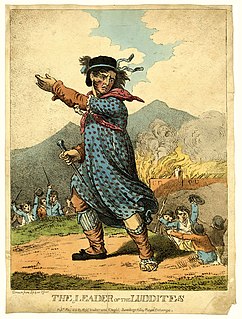 W
WThe Luddites were a secret oath-based organisation of English textile workers in the 19th century, a radical faction which destroyed textile machinery through protest. The group are believed to have taken their name from Ned Ludd, a weaver from Anstey, near Leicester. They protested against manufacturers who used machines in what they called "a fraudulent and deceitful manner" to get around standard labour practices. Luddites feared that the time spent learning the skills of their craft would go to waste, as machines would replace their role in the industry.
 W
WThe Orange Guard was a Bulgarian paramilitary organization, belonging to the Bulgarian Agrarian National Union (BANU). It operated during the premiership of the Agrarian politician Aleksandar Stamboliyski, who served as Prime Minister of Bulgaria from 1919 to 1923. The Guard not only functioned as Stamboliyski's bodyguard, but also carried out the government's radical land-reform policies. The militia earned its unofficial name, the Orange Guard, from the opposition - in reference to BANU's official color.
 W
WThe Paper Money Riot, or Exeter Rebellion, was an armed uprising in Exeter, New Hampshire, on September 20, 1786. Following the American Revolution, the nation, states, and many individuals were deeply in debt. The lack of specie and paper currency in circulation made the payment of debts difficult for poor farmers. A group calling themselves Regulators called for the printing of paper money, believing that issuing paper notes on credit would help to stimulate the state's economy.
 W
WThe Regulator Movement, also known as the Regulator Insurrection, War of Regulation, and War of the Regulation, was an uprising in Provincial North Carolina from 1766 to 1771 in which citizens took up arms against colonial officials, whom they viewed as corrupt. Though the rebellion did not change the power structure, some historians consider it a catalyst to the American Revolutionary War. Others like John Spencer Bassett take the view that the Regulators did not wish to change the form or principle of their government, but simply wanted to make the colony's political process more equal. They wanted better economic conditions for everyone, instead of a system that heavily benefited the colonial officials and their network of plantation owners mainly near the coast. Bassett interprets the events of the late 1760s in Orange and surrounding counties as "...a peasants' rising, a popular upheaval."
 W
WSămănătorul or Semănătorul was a literary and political magazine published in Romania between 1901 and 1910. Founded by poets Alexandru Vlahuță and George Coșbuc, it is primarily remembered as a tribune for early 20th century traditionalism, neoromanticism and ethnic nationalism. The magazine's ideology, commonly known as Sămănătorism or Semănătorism, was articulated after 1905, when historian and literary theorist Nicolae Iorga became editor in chief. While its populism, critique of capitalism and emphasis on peasant society separated it from other conservative groups, Sămănătorul shared views with its main conservative predecessor, the Junimea society, particularly in expressing reserve toward Westernization. In parallel, its right-wing agenda made it stand in contrast to the Poporanists, a Romanian populist faction whose socialist-inspired ideology also opposed rapid urbanization, but there was a significant overlap in membership between the two groups. Sămănătorul's relationship with the dominant National Liberal Party was equally ambiguous, ranging from an alliance between Sămănătorul and National Liberal politician Spiru Haret to Iorga's explicit condemnation of 20th century Romanian liberalism.
 W
WDaniel Shays was an American soldier, revolutionary and farmer famous for being one of the leaders and namesake of Shays' Rebellion, a populist uprising against controversial debt collection and tax policies in Massachusetts in 1786-87.
 W
WShays' Rebellion was an armed uprising in Western Massachusetts and Worcester in response to a debt crisis among the citizenry and in opposition to the state government's increased efforts to collect taxes both on individuals and their trades. The fight took place mostly in and around Springfield during 1786 and 1787. American Revolutionary War veteran Daniel Shays led four thousand rebels in a protest against economic and civil rights injustices. Shays was a farmhand from Massachusetts at the beginning of the Revolutionary War; he joined the Continental Army, saw action at the Battles of Lexington and Concord, Battle of Bunker Hill, and Battles of Saratoga, and was eventually wounded in action.
 W
WThe Stolypin agrarian reforms were a series of changes to Imperial Russia's agricultural sector instituted during the tenure of Prime Minister Pyotr Stolypin. Most, if not all, of these reforms were based on recommendations from a committee known as the "Needs of Agricultural Industry Special Conference," which was held in Russia between 1901–1903 during the tenure of Minister of Finance Sergei Witte.
 W
WLa Vía Campesina is an international farmers organization founded in 1993 in Mons, Belgium, formed by 182 organisations in 81 countries, and describing itself as "an international movement which coordinates peasant organizations of small and middle-scale producers, agricultural workers, rural women, and indigenous communities from Asia, Africa, America, and Europe".
 W
WWorld Food Day is an international day celebrated every year worldwide on 16 October to commemorate the date of the founding of the United Nations Food and Agriculture Organization in 1945. The day is celebrated widely by many other organizations concerned with hunger and food security, including the World Food Programme, the World Health Organization and the International Fund for Agricultural Development. WFP received the Nobel Prize in Peace for 2020 for their efforts to combat hunger, contribute to peace in conflict areas, and for playing a leading role in stopping the use of hunger in the form of a weapon for war and conflict.
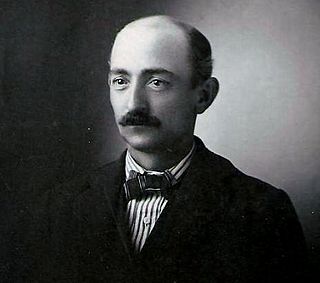 W
WFrederick Hinde Zimmerman was an American banker, farmer, real estate entrepreneur, businessman, and hotel owner. Due to his large land holdings and expertise in farming, Zimmerman became a notable farmer, breeder, and real estate entrepreneur. Zimmerman's farm, originally purchased by his grandfather Thomas S. Hinde from the federal government in 1815, included the Grand Rapids Dam, Hanging Rock, and Buttercrust. His first experience running a business was in 1883 when he ran a grocery store in Fort Smith, Arkansas with his cousin Harry Hinde. Many of his businesses centered on his family farm, but in later years Zimmerman achieved success through his ownership and investment in mines, banks, and real estate. He also owned or invested in the Hanging Rock and Grand Rapids Dam Farm Company, the Grand Rapids Hotel Park Company, and the Wabash Bull-Frog Mines Company.